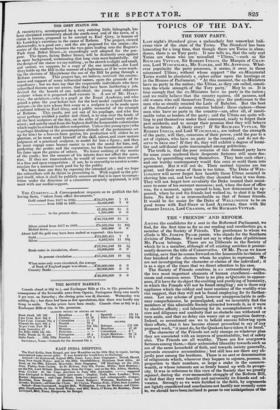TOPICS OF THE DAY.
THE TORY PARTY.
LAST night's Standard gives a melancholy but somewhat ludi- crous view of the state of the Tories. The Standard has been lamenting for a long time, that though there are Tories in abun- dance, there is no Tory party. It now tells us, that the only real Tories are those who are miscalled "Ultras,"—such as Sir RICHARD VYVYAN, Sir ROBERT INGLIS, the Marquis of CHAN- DOS, Lord WINCHILSEA, Mr. SADLER, and Mr. ATTWOOD. What- ever popularity the party possesses, it seems, it owes to these misnamed Ultras; without whose support "the ex-Ministerial Tories would be absolutely a cipher either upon the hustings or in the Houses of Parliament." "At this moment, the ex-Ministers have no party in the nation; the Ultras, as they are called, consti- tute the whole strength of the Tory party." May be so. It is true enough that the ex-Ministers have no party in the nation; and we really believe that the country squires, old parsons, and old women who call themselves Tories, give the preference to the men who so stoutly resisted the Lady of Babylon. But the best of the Standard's notions remains behind: these ciphers—these men who have no party in the country—are, after all, of inesti- mable value as leaders of the party; and the Ultras are quite wil- ling to put themselves under their command, ready to forget their past misdeeds, and to accept their promise that they will behave better in future. A likely story! If Sir RICHARD VYVYAN, Sir ROBERT INGLIS, and Lord WINCHILSEA, are indeed the strength of the party, will they, conscious of their power, yield the par to a set of ciphers, who have no party in the country, and do not de- serve to have one? If they do, they will exhibit a degree of humi- lity and self-denial quite unexampled among politicians.
The truth is, that the poor remains of this doomed party have for some years rendered their desperate fortunes still more des- perate, by quarrelling among themselves. They hate each other; and our worthy contemporary would fain coax or scold them into agreement. But it will not do. Their mutual injuries are too great, and their sense of them is too bitter. The Duke of WEL- LINGTON will never forget how heartily these Ultras assisted in shoving him out, and how loudly they shouted when it was done. They will not forget how cavalierly the Duke treated their resist- ance to some of his recreant measures; and, when the door of office was, for a moment, again opened to him, how determined he ap- peared, when he and his friends had walked in, to shut it in their faces. No feud is so irreconcileable as that of former friends. It would be far easier for the Duke of WELLINGTON to be on good terms with Earl GREY or Lord ALTHORP, than with Sir ROBERT INGLIS, Lord CHANDOS, or Sir RICHARD VYVYAN.


























 Previous page
Previous page